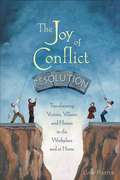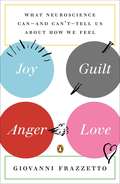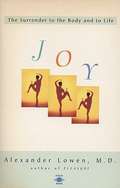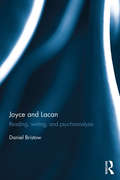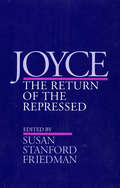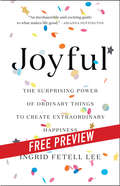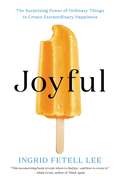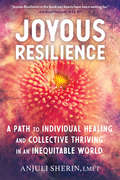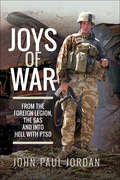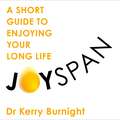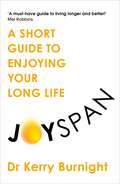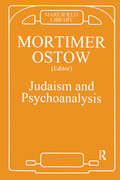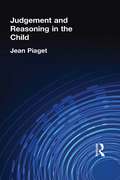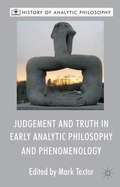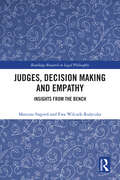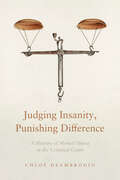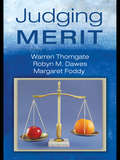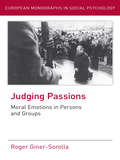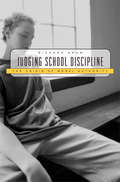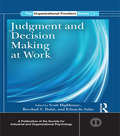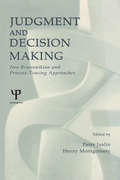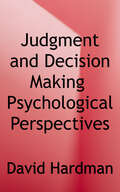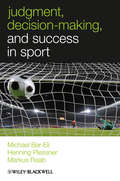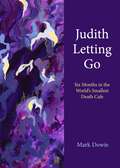- Table View
- List View
Joy of Conflict Resolution
by Gary HarperThe rapid rate of change in the workplace and among families often leads to conflict and confrontation which can undermine productivity and poison relationships. The Joy of Conflict Resolution helps readers understand conflict and why it arises through the lens of the "drama triangle" of victims, villains and heroes. In an accessible, engaging and light-hearted style that uses stories and humor to explore potentially emotionally charged situations, it provides proven and practical skills to move beyond confrontation to resolve conflicts collaboratively.
Joy, Guilt, Anger, Love
by Giovanni FrazzettoIs science ever enough to explain why we feel the way we feel? In this engaging account, renowned neuroscientist Giovanni Frazzetto blends cutting-edge scientific research with personal stories to reveal how our brains generate our emotions. He demonstrates that while modern science has expanded our knowledge, investigating art, literature, and philosophy is equally crucial to unraveling the brain’s secrets. What can a brain scan, or our reaction to a Caravaggio painting, reveal about the deep seat of guilt? Can ancient remedies fight sadness more effectively than antidepressants? What can writing poetry tell us about how joy works? Structured in seven chapters encompassing common human emotions-anger, guilt, anxiety, grief, empathy, joy, and love-Joy, Guilt, Anger, Love offers a way of thinking about science and art that will help us to more fully understand ourselves and how we feel. .
Joy: The Surrender to the Body and to Life
by Alexander LowenDr. Alexander Lowen believes that the key to personal change is contact with the body. This book rests on the idea that joy is a natural state, a positive feeling of the body, possible only through surrender to the body by listening to its wisdom and what it communicates. The book reviews the essentials of bioenergetic therapy in the light of other therapeutic approaches, and teaches how to surrender to joy by using bioenergetic principles. It discusses aggression, disappointment, sexual abuse, the fear of dying and issues of spirituality as it attempts to make joy a more common experience.
Joyce and Lacan: Reading, Writing and Psychoanalysis
by Daniel BristowWhat happens when the intellectual giant of twentieth-century literature, James Joyce, is made an object of consideration and cause of desire by the intellectual giant of modern psychoanalysis, Jacques Lacan? This is what Joyce and Lacan explores, in the three closely interrelated areas of reading, writing, and psychoanalysis, by delving into Joyce’s own relationship with psychoanalysis in his lifetime. The book concentrates primarily on his last text, Finnegans Wake, the notorious difficulty of which arises from its challenging the intellect itself, and our own processes of reading. As well as the centrality of the Wake, concepts of Joycean ontology, sanity, singularity, and sexuality are excavated from sustained analysis of his earliest writings onward. To be ‘post-Joycean’, as Lacan describes it, means then to be in the wake not only of Joyce, but also of Lacan’s interventions on the Irish writer made in the mid-70s. It was this encounter that gave rise to concepts that have gained currency in today’s psychoanalytic theory and practice, and importance in wider critical contexts. The notions of the sinthome, lalangue, and Lacan’s use of topology and knot theory are explored within, as well as new theories being launched. The book will be of interest to psychoanalysts, literary theorists, and students and teachers of literature, theory, or the works of Joyce and Lacan.
Joyce: The Return of the Repressed
Did James Joyce, that icon of modernity, spearhead the dismantling of the Cartesian subject? Or was he a supreme example of a modern man forever divided and never fully known to himself? This volume reads the dialogue of contradictory cultural voices in Joyce’s works—revolutionary and reactionary, critical and subject to critique, marginal and central. It includes ten essays that identify repressed elements in Joyce’s writings and examine how psychic and cultural repressions persistently surface in his texts. Contributors include Joseph A. Boone, Marilyn L. Brownstein, Jay Clayton, Laura Doyle, Susan Stanford Friedman, Christine Froula, Ellen Carol Jones, Alberto Moreirias, Richard Pearce, and Robert Spoo.
Joyful: The Surprising Power of Ordinary Things to Create Extraordinary Happiness
by Ingrid Fetell LeeDesigner and TED star Ingrid Fetell Lee explains how to cultivate a happier, healthier life by making small changes to your surroundings. Have you ever wondered why we stop to watch the orange glow that arrives before sunset, or why we flock to see cherry blossoms bloom in spring? Is there a reason that people -- regardless of gender, age, culture, or ethnicity -- are mesmerized by baby animals, and can't help but smile when they see a burst of confetti or a cluster of colorful balloons. We are often made to feel that the physical world has little or no impact on our inner joy. Increasingly, experts urge us to find balance and calm by looking inward -- through mindfulness or meditation -- and muting the outside world. But what if the natural vibrancy of our surroundings is actually our most renewable and easily accessible source of joy? In Joyful, designer Ingrid Fetell Lee explores how the seemingly mundane spaces and objects we interact with every day have surprising and powerful effects on our mood. Drawing on insights from neuroscience and psychology, she explains why one setting makes us feel anxious or competitive, while another fosters acceptance and delight -- and, most importantly, she reveals how we can harness the power of our surroundings to live fuller, healthier, and truly joyful lives.
Joyful: The Surprising Power of Ordinary Things to Create Extraordinary Happiness
by Ingrid Fetell LeeDesigner and TED star Ingrid Fetell Lee explains how to cultivate a happier, healthier life by making small changes to your surroundings. Have you ever wondered why we stop to watch the orange glow that arrives before sunset, or why we flock to see cherry blossoms bloom in spring? Is there a reason that people -- regardless of gender, age, culture, or ethnicity -- are mesmerized by baby animals, and can't help but smile when they see a burst of confetti or a cluster of colorful balloons. We are often made to feel that the physical world has little or no impact on our inner joy. Increasingly, experts urge us to find balance and calm by looking inward -- through mindfulness or meditation -- and muting the outside world. But what if the natural vibrancy of our surroundings is actually our most renewable and easily accessible source of joy? In Joyful, designer Ingrid Fetell Lee explores how the seemingly mundane spaces and objects we interact with every day have surprising and powerful effects on our mood. Drawing on insights from neuroscience and psychology, she explains why one setting makes us feel anxious or competitive, while another fosters acceptance and delight -- and, most importantly, she reveals how we can harness the power of our surroundings to live fuller, healthier, and truly joyful lives.
Joyous Resilience: A Path to Individual Healing and Collective Thriving in an Inequitable World
by Anjuli SherinAn intersectional guide to building resilience and reclaiming joyWith so much information available on how to build resilience--from meditation, exercise, and time in nature, to the latest neuroscience-backed studies--have you ever wondered what's holding you back? If you commit to self-care but find yourself exhausted, unhappy, or anxious, do you wonder what's missing?The fact is, we are all navigating an exhausting, disconnecting, do-more-buy-more culture that disproportionately harms those with marginalized identities and leads us to believe that our thriving depends solely on individual effort. Mainstream wellness culture doesn't account for the ways that social oppression and economic injustice intersect to make resilience diffi cult for many of us to access in the first place. So, where do we begin? In this warm and accessible guide, Pakistani American therapist Anjuli Sherin provides a healing path to make thriving possible for everyone. Through compelling client stories and reflective exercises, she offers a culturally informed, body -centered model that shows us how cultivating self-nurturance, healthy boundaries, pleasure, and a soulful connection to the natural world can give us the generative energy needed to heal individual and collective trauma and shape our world from an inner magic called joyous resilience.
Joys of War: From the Foreign Legion, the SAS and into Hell with PTSD
by John-Paul JordanA Special Forces veteran and former Legionnaire tells of his military adventures—and of the personal battle that followed him home. In war, John-Paul Jordan was the first to batter down the door, whether he was facing bullets or bombs. In the wake of the 9/11 attacks, the young Irishman set off to join the French Foreign Legion. He would go on to provide security in Iraq, serve his country in Afghanistan, and protect journalists on the front line in Libya. He was decorated for his leadership and bravery—but his biggest fight would come after he left the battlefield. In this memoir he recounts the camaraderie, action, and danger he experienced—and how he later found himself of prisoner of war to PTSD. Dehumanized by the professionals he turned to for help, this Special Forces veteran and former Legionnaire was brought to his knees. His marriage was over; his home was lost. In isolation, his world unraveled, and the seeds of destruction had been well and truly sown. Knowing he would never see military action again and faced with the realization of the war raging within him in the spiral of PTSD, John-Paul felt condemned as a man. But, on April 1, 2016, he surrendered. He asked for help . . . and found the answers within. His story is a testament to the strength of the human spirit: to get back up and to lead from the front. He did not go through all that just to go through all that. This is the story of his return to freedom and joy. Buckle up, because this veteran doesn&’t do anything in half measures.
Joyspan: A Short Guide to Enjoying your Long Life
by Dr Dr Kerry Burnight'This book completely changed how I see myself growing older. It's not just about adding years to your life - it's about making those years incredible. A must-have guide to living longer and better!' - MEL ROBBINSA prominent US gerontologist's practical, science-based guide to aging wellGrowing old in today's society is daunting. The core message of this book is that losing your quality of life as you age is not inevitable. You can live a great life all the way to the end by leveraging what "older you" does better. By the end of this book, your fear of aging will be replaced with confidence that you will know how to age into the best version of yourself.Joyspan is the practical guide readers have been looking for. A rich body of evidence confirms that a number of strengths peaks with age: judgment, empathy, patience, and appreciation. Older you will have better problem-solving skills, more resilience, and a deeper and more robust spiritual life. When you harness these strengths, growing older becomes an era of expansion rather than contraction. In a society that can you make you feel invisible, staying vital requires you to stay visible to yourself so that you uncover the strengths and fullness of your life.
Joyspan: A Short Guide to Enjoying your Long Life
by Dr Dr Kerry Burnight'This book completely changed how I see myself growing older. It's not just about adding years to your life - it's about making those years incredible. A must-have guide to living longer and better!' - MEL ROBBINSA prominent US gerontologist's practical, science-based guide to aging wellGrowing old in today's society is daunting. The core message of this book is that losing your quality of life as you age is not inevitable. You can live a great life all the way to the end by leveraging what "older you" does better. By the end of this book, your fear of aging will be replaced with confidence that you will know how to age into the best version of yourself.Joyspan is the practical guide readers have been looking for. A rich body of evidence confirms that a number of strengths peaks with age: judgment, empathy, patience, and appreciation. Older you will have better problem-solving skills, more resilience, and a deeper and more robust spiritual life. When you harness these strengths, growing older becomes an era of expansion rather than contraction. In a society that can you make you feel invisible, staying vital requires you to stay visible to yourself so that you uncover the strengths and fullness of your life.
Judaism and Psychoanalysis
by Mortimer OstowIs psychoanalysis a "Jewish science"? Ten essays contributed by the editor and distinguished scholars explore the Jewishness of psychoanalysis, its origins in the Jewish situation of late nineteenth century Europe, Freud's Jewishness and the Jewishness of his early colleagues. They also exemplify what the psychoanalytic approach can contribute to the study of Judaism. Clinical studies illuminate the issue of Jewish identity and psychological significance of the bar mitzvah experience. Theoretical essays throw light on Jewish history, Jewish social and communal behavior, Jewish myths and legends, religious ideas and thoughts.What are the major determinants of Jewish identity? What is the role of Jewish education in establishing and maintaining Jewish identity? What does the Midrash tell us about the meaning of anxiety to the traditional Jew, and how does Judaism attempt to deal with anxiety? What strategies have Jews used to survive an anti-Jewish world? Under what circumstances has the compliant posture of Johanen ben Zakkai been celebrated, and under what circumstances the defiance of the martyrs of Massada?
Judgement and Reasoning in the Child
by Jean PiagetOver a period of six decades, Jean Piaget conducted a program of naturalistic research that has profoundly affected our understanding of child development.
Judgement and Truth in Early Analytic Philosophy and Phenomenology
by Mark TextorWhat is judgement? is a question that has exercised generations of philosophers. Early analytic philosophers (Frege, Russell and Wittgenstein) and phenomenologists (Brentano, Husserl and Reinach) changed how philosophers think about this question. This book explores and assesses their contributions and help us to retrace their steps.
Judges, Decision Making and Empathy: Insights from the Bench (Routledge Research in Legal Philosophy)
by Mateusz Stępień Ewa Wilczek-RużyczkaThis book presents empirical research uncovering the views and experiences of Polish judges regarding the utilization of empathy in their work. Although there is growing interest in the role of empathy in judicial decision-making, there is little research on how judges themselves approach this issue. This volume offers an alternative to the usual focus on common law jurisdictions. It adopts a perspective that underscores the impact of professional pressures on judges’ empathic abilities, leading to a form of "empathy labor" influenced by the unique characteristics of the judicial profession. It offers an in-depth examination of judges’ opinions, collected through an empirical study involving in-depth interviews. The narrative delves into real cases and judicial behaviors discussed by judges, providing reference to relevant literature from other jurisdictions. The core finding of the study reveals that while judges may differ in their approaches to empathy in a judicial context, many of their practices and strategies can be linked to empathy-like phenomena. The findings also substantiate the claim that empathy used by judges is not the same as judicial empathy, which covers empathic abilities integrated into performing the judicial role. This applied theoretical perspective of "empathy labor" offers an intriguing view of how the occupational context influences judges’ empathic inclinations throughout their careers. In addition to demonstrating how judges understand the role of empathy in their work, the book outlines a scenario for empathy training based on their experiences and expectations. Presenting an original approach to studying the role of empathy in judicial decision making, the book will be of interest to academics and researchers working in the areas of philosophy of law, legal theory, sociology of law, psychology of law, and emotions studies.
Judging Insanity, Punishing Difference: A History of Mental Illness in the Criminal Court (The Cultural Lives of Law)
by Chloé DeambrogioIn Judging Insanity, Punishing Difference, Chloé Deambrogio explores how developments in the field of forensic psychiatry shaped American courts' assessments of defendants' mental health and criminal responsibility over the course of the twentieth century. During this period, new psychiatric notions of the mind and its readability, legal doctrines of insanity and diminished culpability, and cultural stereotypes about race and gender shaped the ways in which legal professionals, mental health experts, and lay witnesses approached mental disability evidence, especially in cases carrying the death penalty. Using Texas as a case study, Deambrogio examines how these medical, legal, and cultural trends shaped psycho-legal debates in state criminal courts, while shedding light on the ways in which experts and lay actors' interpretations of "pathological" mental states influenced trial verdicts in capital cases. She shows that despite mounting pressures from advocates of the "rehabilitative penology," Texas courts maintained a punitive approach towards defendants allegedly affected by severe mental disabilities, while allowing for moralized views about personalities, habits, and lifestyle to influence psycho-legal assessments, in potentially prejudicial ways.
Judging Merit
by Robyn M. Dawes Warren Thorngate Margaret FoddyMerit-based tests and contests have become popular methods for allocating rewards – from trophies to contracts, jobs to grants, admissions to licenses. With origins in jurisprudence, methods of rewarding merit seem fairer than those rewarding political or social connections, bribery, aggression, status, or wealth. Because of this, merit-based competitions are well-suited to the societal belief that people should be rewarded for what they know or do, and not for who they know or are; however, judging merit is rarely an easy task – it is prone to a variety of biases and errors. Small biases and errors, especially in large competitions, can make large differences in who or what is rewarded. It is important, then, to learn how to spot flaws in procedures for judging merit and to correct them when possible. Based on over 20 years of theory and research in human judgment, decision making and social psychology, this unique book brings together for the first time what is known about the processes and problems of judging merit and their consequences. It also provides practical suggestions for increasing the fairness of merit-based competitions, and examines the future and limits of these competitions in society.
Judging Passions: Moral Emotions in Persons and Groups (European Monographs in Social Psychology)
by Roger Giner-SorollaShortlisted for the British Psychological Society Book Award (Academic Monograph category) 2014! A CHOICE Outstanding Academic Title 2013! Psychological research shows that our emotions and feelings often guide the moral decisions we make about our own lives and the social groups to which we belong. But should we be concerned that our important moral judgments can be swayed by "hot" passions, such as anger, disgust, guilt, shame and sympathy? Aren’t these feelings irrational and counterproductive? Using a functional conflict theory of emotions (FCT), Giner-Sorolla proposes that each emotion serves a number of different functions, sometimes inappropriately, and that moral emotions in particular are intimately tied to problems faced by the individuals in a group, and by groups interacting with each other. Specifically, the author suggests that these emotions help us, as individuals and group members, to: Appraise developments in the environment Learn through association Regulate our own behavior Communicate convincingly with others. Drawing on extensive research, including many studies from the author’s own lab, this book shows why emotions work to encourage reasonable moral behaviour, and why they sometimes fail. This is the first single-authored volume in the field of psychology dedicated to a separate examination of the major moral and positive emotions. As such, the book is ideal reading for researchers, postgraduates and undergraduates of social psychology, sociology, philosophy and politics.
Judging School Discipline: The Crisis of Moral Authority
by Richard ArumReprimand a class comic, restrain a bully, dismiss a student for brazen attire--and you may be facing a lawsuit, costly regardless of the result. This reality for today's teachers and administrators has made the issue of school discipline more difficult than ever before--and public education thus more precarious. This is the troubling message delivered in Judging School Discipline, a powerfully reasoned account of how decades of mostly well-intended litigation have eroded the moral authority of teachers and principals and degraded the quality of American education. Judging School Discipline casts a backward glance at the roots of this dilemma to show how a laudable concern for civil liberties forty years ago has resulted in oppressive abnegation of adult responsibility now. In a rigorous analysis enriched by vivid descriptions of individual cases, the book explores 1,200 cases in which a school's right to control students was contested. Richard Arum and his colleagues also examine several decades of data on schools to show striking and widespread relationships among court leanings, disciplinary practices, and student outcomes; they argue that the threat of lawsuits restrains teachers and administrators from taking control of disorderly and even dangerous situations in ways the public would support.
Judgment and Decision Making as a Skill
by Michael R. Waldmann Mandeep K. Dhami Anne SchlottmannThis book presents a comprehensive review of emerging theories and research on the dynamic nature of human judgment and decision making (JDM). Leading researchers in the fields of JDM, cognitive development, human learning and neuroscience discuss short-term and long-term changes in JDM skills. The authors consider how such skills increase and decline on a developmental scale in children, adolescents and the elderly; how they may be learned; and how JDM skills can be improved and aided. In addition, beyond these behavioral approaches to understanding JDM as a skill, the book provides fascinating new insights from recent evolutionary and neuropsychological approaches. The authors identify opportunities for future research on the acquisition and changing nature of JDM. In a concluding chapter, eminent past presidents of the Society for Judgment and Decision Making provide personal reflections and perspectives on the notion of JDM as a dynamic skill.
Judgment and Decision Making at Work (SIOP Organizational Frontiers Series)
by Scott Highhouse Eduardo Salas Reeshad S. DalalEmployees are constantly making decisions and judgments that have the potential to affect themselves, their families, their work organizations, and on some occasion even the broader societies in which they live. A few examples include: deciding which job applicant to hire, setting a production goal, judging one’s level of job satisfaction, deciding to steal from the cash register, agreeing to help organize the company’s holiday party, forecasting corporate tax rates two years later, deciding to report a coworker for sexual harassment, and predicting the level of risk inherent in a new business venture. In other words, a great many topics of interest to organizational researchers ultimately reduce to decisions made by employees. Yet, numerous entreaties notwithstanding, industrial and organizational psychologists typically have not incorporated a judgment and decision-making perspective in their research. The current book begins to remedy the situation by facilitating cross-pollination between the disciplines of organizational psychology and decision-making. The book describes both laboratory and more “naturalistic” field research on judgment and decision-making, and applies it to core topics of interest to industrial and organizational psychologists: performance appraisal, employee selection, individual differences, goals, leadership, teams, and stress, among others. The book also suggests ways in which industrial and organizational psychology research can benefit the discipline of judgment and decision-making. The authors of the chapters in this book conduct research at the intersection of organizational psychology and decision-making, and consequently are uniquely positioned to bridging the divide between the two disciplines.
Judgment and Decision Making: Neo-brunswikian and Process-tracing Approaches
by Henry Montgomery Peter JuslinResearch on human judgment and decision making has been strongly guided by a normative/descriptive approach, according to which human decision making is compared to the normative models provided by decision theory, statistics, and the probability calculus. A common empirical finding has been that human behavior deviates from the prescriptions by normative models--that judgments and decisions are subject to cognitive biases. It is interesting to note that Swedish research on judgment and decision making made an early departure from this dominating mainstream tradition, albeit in two different ways. The Neo-Brunswikian research highlights the relationship between the laboratory task and the adaptation to a natural environment. The process-tracing approach attempts to identify the cognitive processes before, during, and after a decision. This volume summarizes current Swedish research on judgment and decision making, covering topics, such as dynamic decision making, confidence research, the search for dominance structures and differentiation, and social decision making.
Judgment and Decision Making: Psychological Perspectives (BPS Textbooks In Psychology Series)
by David HardmanThis is a refreshingly accessible text that explores the wide variety of ways people make judgments. It examines assessments of probability, frequency, and causation; as well as how decisions are rendered under conditions of risk and uncertainty. Topics covered include dynamic, every day, and group decision making; individual differences; and the nature of mind and brain in relation to judgment and decision making. <p><p>Offering up-to-date theoretical coverage, including perspectives from evolutionary psychology and neuroscience, this volume has everything a psychology student needs for BPS accreditation, whilst drawing out the practical applications for non-psychology students with plentiful examples from business, economics, sport, law, and medicine. The latest addition to the BPS Textbooks in Psychology series, this thorough text provides a succinct, reader-friendly account of the field of judgment and decision making.
Judgment, Decision-making and Success in Sport
by Henning Plessner Michael Bar-Eli Markus RaabJudgment, Decision-Making and Success in Sport presents a thorough overview and assessment of the study of Judgment and Decision-Making (JDM) in sports psychology, and represents an important source of information for those interested in the possible causes and reasons for success and failure in sport.The only book to apply the principles of JDM to sportApplies theory to practice by looking at problems of athletes, coaches, and referees and providing recommendations for dealing with themOffers an overview of current JDM researchUseful for psychologists, physical education teachers, sports scientists, and researchers in this field
Judith Letting Go: Six Months in the World's Smallest Death Cafe
by Mark DowieAn old man learns how to die from a poet facing deathFor the entire six months that Mark Dowie became friends with Judith Tannenbaum, they both knew she was going to die. In fact, for most of that time they knew the exact hour she would go: sometime between 11:00 AM and noon, December 5, 2019, which she did.Judith was a poet, writer, activist, and artist who worked for decades teaching and collaborating with imprisoned lifers. Beloved by her community, Judith told almost no one when she was diagnosed with an incurable disease that would cause her immeasurable pain. Instead she chose to end life on her own terms. When they met, Mark Dowie had already been working for years to advocate for physician assistance in dying for terminally ill people in his home state of California. He helped many friends along this path, but it wasn't until he was introduced to Judith through a mutual friend that he came to a profound new understanding of death. Mark and Judith created a two-person "death café," a group devoted to discussions of death. They talked about many things during Judith's final months, but the rapidly approaching moment of her death came to inform and shape their entire conversation. Death was, as she said, “the undercurrent and the overstory of our relationship.” Judith Letting Go supports the right to plan one’s death, but it is ultimately about the lost human art of releasing everything that matters to the living in preparation for the inevitable.
